Composting is one essential item you should include if you want to improve your garden. (If you think we’re your compost activators!) if you haven’t started composting yourself, we’re here to help you begin.
With Astergardening’s Composting tips for beginners, your garden will look more VIBRANT and FULL of LIFE.
There are so many options to choose from when composting. You probably get to know so much that you employ more than one method. With our expertise, you’ll be able to identify what would suit you best.
From compost bins to composting materials, we’ll tell you EVERYTHING. Your garden beds bloom like never before, all because of your thriving compost pile! What a happy plant parent you are going to become now.
A liquid fertilizer has always been an option, but organic is always better. There’s nothing like fresh compost.
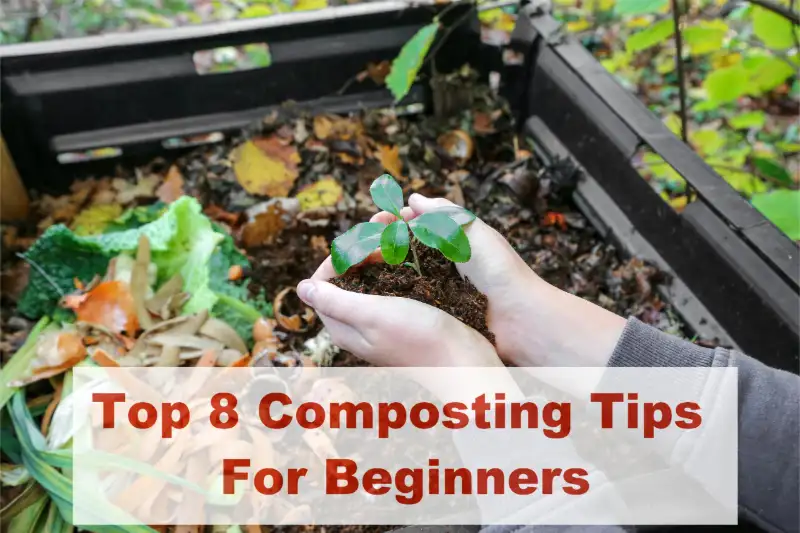
What is Compost?
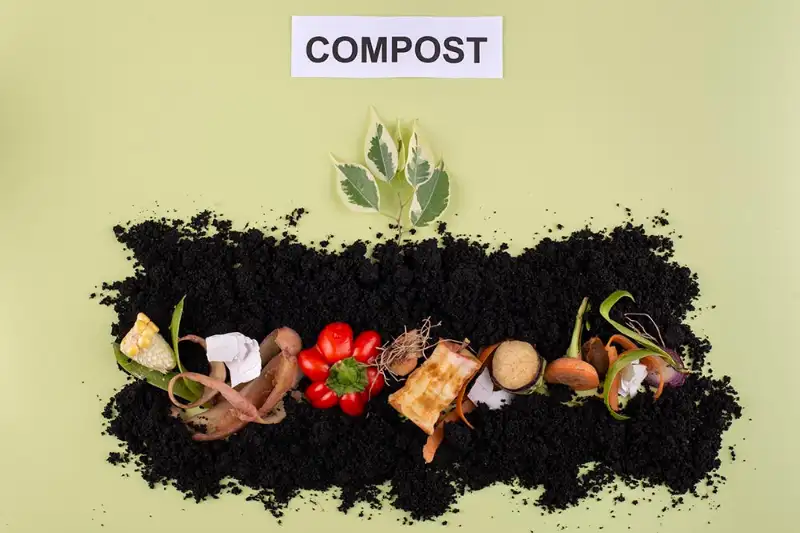
Compost is a valuable resource used in gardening to enrich the soil and improve plant growth. It combines various materials. Such as yard waste, food scraps, and other organic matter, and it allows them to decompose over time.
Composting is a natural process aided by microorganisms. They break down the material into a nutrient-rich substance.
Compost helps to improve soil structure, drainage, and water-holding capacity. Compost is an essential resource for gardeners and farmers.
Composting at home can also reduce waste. Alongside it helps the environment, diverting material from landfills.
Benefits of Composting
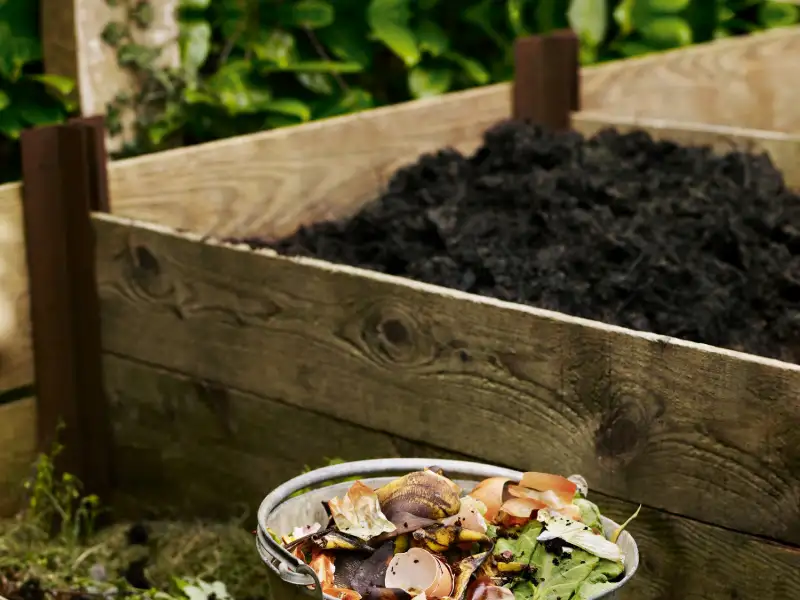
There are many benefits of composting in gardening, including:
- Improving soil structure
Compost adds organic matter to the soil. It also helps to improve soil structure and its ability to hold water and nutrients.
- Providing nutrients
Compost is a rich source of NUTRIENTS. It also includes nitrogen, phosphorus, and potassium, essential for plant growth.
- Reducing the need for chemical fertilizers
Compost can be used as a NATURAL FERTILIZER. It reduces the need for chemical fertilizers, which can harm the environment.
- Reducing waste
Composting at home reduces landfill waste. as organic material is recycled back into the soil, you’re just being green.
- Attracting beneficial insects
Compost helps to attract beneficial insects. Such as earthworms and ladybugs, which help to control pests and improve soil health.
- Saving money
Using compost saves money on chemical fertilizers and other soil amendments. This makes it a cost-effective way to improve soil health.
Top 8 Composting Tips for Beginners
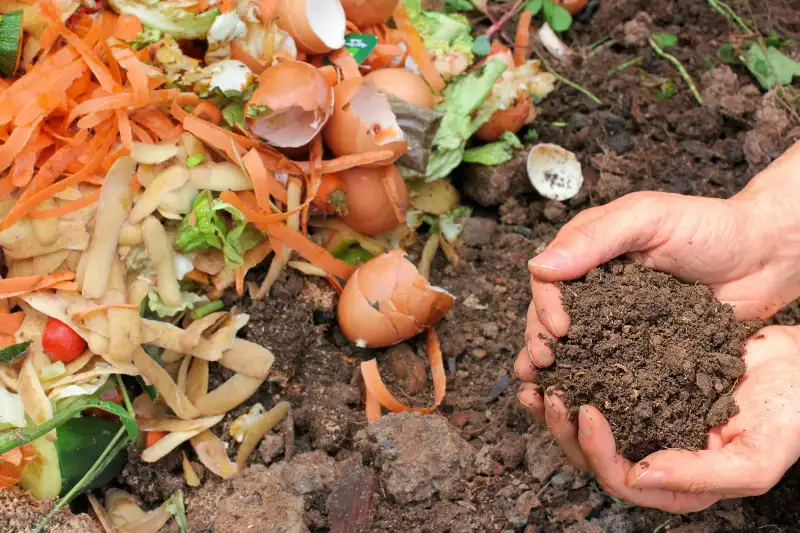
Composting is a great way to reduce waste and provide plant nutrients. If you’re new to composting, here are some tips to get you started:
- Start with a small compost pile.
It’s easier to manage a smaller pile, and you can always add more materials.
- Balance your materials.
A good compost pile should balance green and brown materials. Brown would include dry leaves and twigs. Green would consist of food scraps and grass clippings.
- Add a variety of materials.
Including a mix of different materials will help to provide a range of nutrients for your plants. This includes egg shells, kitchen scraps, and even coffee grounds.
- Keep your compost moist.
Moisture is essential for the decomposition process. So make sure to add water to your compost heap as needed.
- Turn your pile regularly.
Aerate your compost heap to help SPEED UP the decomposition process. This ensures that all materials break down evenly.
- Keep it covered.
Covering your compost heap help retain moisture and heat. Both are critical for decomposition.
- Chop up materials.
Shredding or chopping materials into smaller pieces help them to decompose FASTER. It’ll be easier to include food waste and kitchen scraps in it.
- Please don’t overdo it.
The KEY to successful composting is to find a balance and be patient. It’s important not to add too much of any one type of material, as this SLOW DOWN the decomposition process. It takes time for materials to break down and become compost.
How to Start Composting for Beginners?
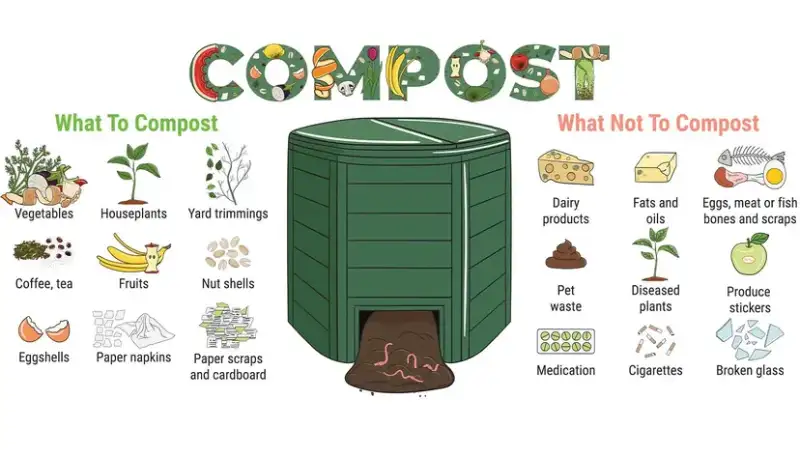
Composting is a simple and rewarding way to reduce waste. It improves soil health and PROVIDES plant nutrients. Here are the steps to get started with composting:
1. Choose a location
Select a spot in your yard that is convenient for you to access and has good drainage.
2. Set up a compost bin or pile
You use a compost BIN or create a HEAP on the ground. If using a compost container, make sure it has plenty of ventilation.
3. Add a mix of brown and green materials.
A good pile should have a balance of “brown” materials, such as dry leaves and twigs. Also, “green” material includes food scraps and grass clippings. These include vegetable peelings from your vegetable garden or kitchen waste. Yes, this includes egg shells.
4. Keep it moist.
Moisture is ESSENTIAL for the decomposition process. So make sure to add water to your finished compost as needed.
5. Turn your pile regularly.
Aerating your bank help to speed up the decomposition process. This ensures that all materials break down evenly.
6. Add a cover
Covering your compost help retain moisture and heat. Both are CRITICS for the decomposition process.
7. Be patient
It takes time for materials to break down and become compost. So be patient and add materials as they become available.
What Are Some of the Composting Methods?
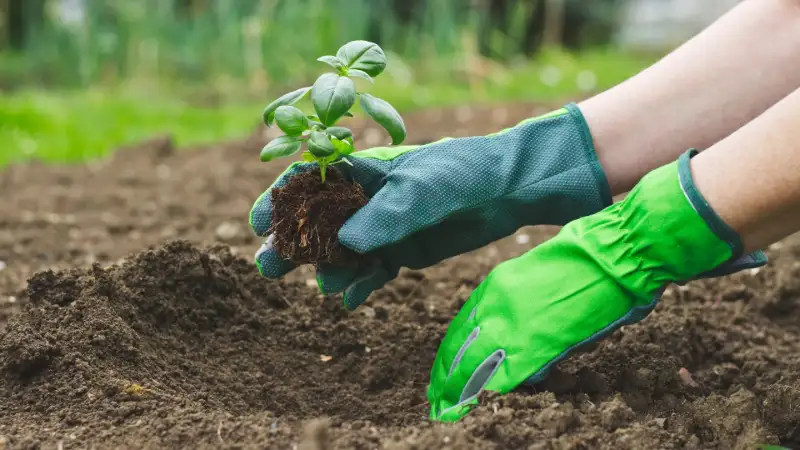
There are several compost methods, including:
Pile composting
This process involves creating a pile of organic materials. Allowing them to decompose over time. This could include garden waste, compost tea, and fruit and vegetable scraps.
Bin composting
Bin composting involves using a container. Such as a PLASTIC or WOODEN bin to hold the composting materials. Bins can be purchased or built at home and can be placed in a convenient location in the yard. You can even get composting bins for beginners.
Trench composting
This involves digging a trench in the ground and filling it with organic materials. These are then covered with soil. As the materials decompose, they enrich the soil and can be used to grow plants.
Vermicomposting
Vermicomposting is a composting that uses worms to break down organic material. It’s done in a small space, such as an apartment. The resulting compost is called “worm compost” or “vermicompost.”
Bokashi composting
This uses a unique mix of microorganisms to break down food scraps and other organic waste. It is a relatively QUICK PROCESS and can be done as INDOOR composting.
The type of composting method you choose depends on your needs and preferences. Also, the space and resources available to you.
What Are The Common Problems with Composting?
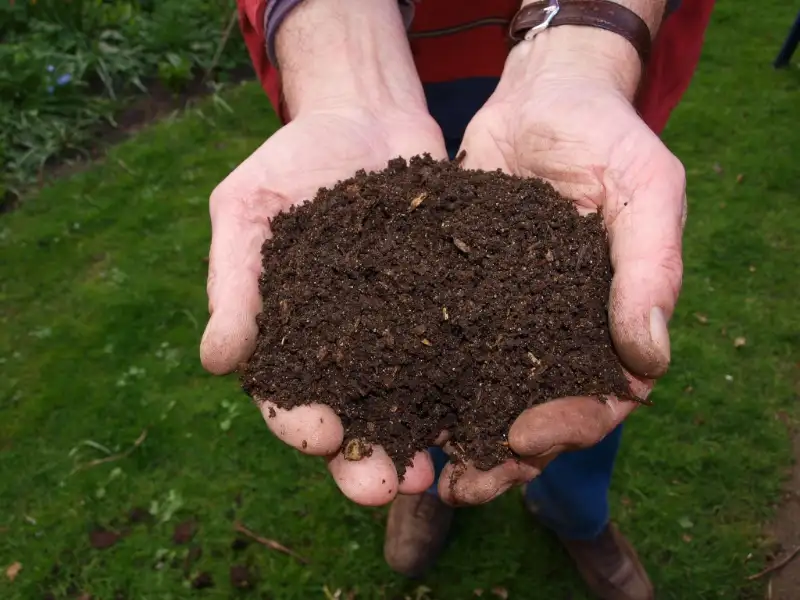
A few common problems can occur during the composting process, including:
Odor: If the compost piles become too wet or lack oxygen, they can produce an unpleasant smell. To prevent this, make sure to add a mix of green and brown materials and keep the pile moist but not too wet.
Pests
Some pests, such as rodents and flies, maybe ATTRACTED to the compost pile. To prevent this, cover the bank with a lid or tarp, and avoid adding MEAT or DAIRY PRODUCTS to the compost.
Hot composting method
Requires heat to break down the organic materials. The decomposition process may be slowed down if the pile is not generating enough heat. To remedy this, turn the pile regularly to aerate it. Then add materials that will create heat. Such as fresh grass clippings or household waste.
Lack of moisture
The decomposition process will slow down if the compost pile becomes too DRY. To prevent this, add water to the pile as needed.
Lack of nutrients
If the compost contains a wide range of materials, it will have all the necessary nutrients. To REMEDY this, add a variety of materials to the pile.
You can ensure that your compost pile is healthy by addressing these common problems.
By addressing these common problems, you can ensure your compost pile is healthy.
What Type of Composting Bin Should You Use? How to Choose?
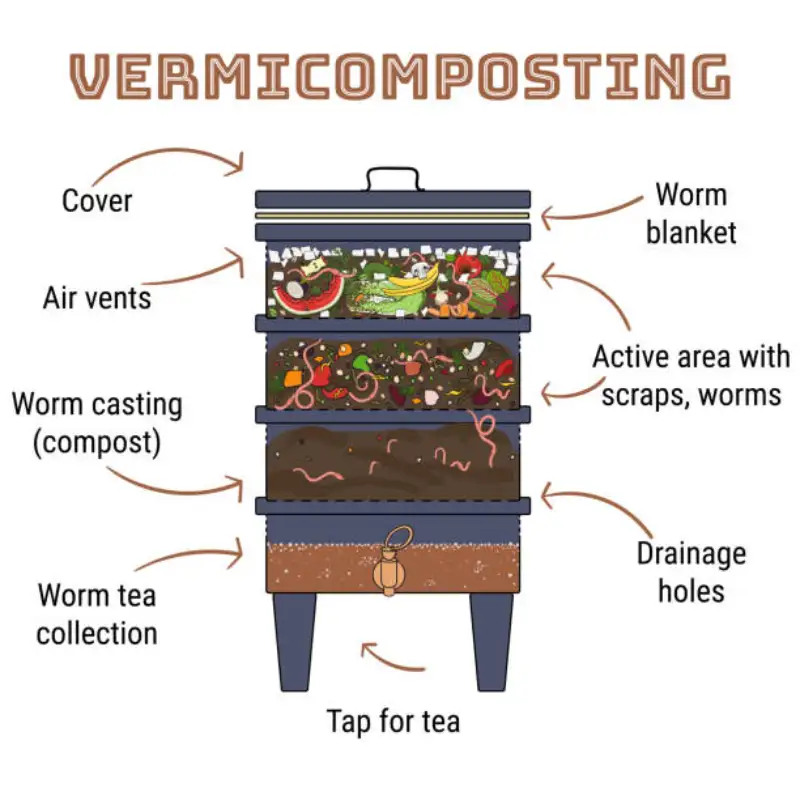
There are several types of compost containers that you can use, including:
- Plastic bins: Plastic compost bins are lightweight, easy to move, and inexpensive. They can be purchased in various sizes and typically have a lid to keep out pests and retain moisture.
- Wooden bins: ATTRACTIVE and can blend in with the natural surroundings. They can be purchased or built at home and typically have slats or openings to allow ventilation.
- Tumblers: The compost tumbler allows you to quickly turn the compost pile by rotating the compost bin. This helps to AERATE the pile and speed up the decomposition process.
- Worm bins: A worm compost bin is designed explicitly for vermicomposting. This uses worms to break down organic material. They are TYPICALLY small and can be used in small spaces, such as apartments.
When choosing a bin, consider the following factors:
- Size: Choose a container appropriate for the number of organic materials available.
- Location: Select a site that is convenient for you to access and has good drainage.
- Cost: Determine your BUDGET and select a compost bin that FITS within your price range.
What you choose will depend on your needs and preferences. Also, the space and resources are AVAILABLE to you.
FAQs about Composting Tips For Beginners
1. Should compost be in the sun or in the shade?
Compost can be placed in the sun or shade. In general, locating the compost pile in an area that receives some sunlight is best. This helps the heat to rise and speed up the decomposition process.
However, it is essential to keep the pile moist. Excessive heat can cause the materials to dry out and slow decomposition. If you live in a hot, dry climate, locate the compost pile in a shaded area to prevent it from drying.
Ultimately, the key to successful composting is to find a balance. Adjust the compost bin location, ensure it stays moist and has adequate ventilation.
2. How long does it take to compost?
The time it takes for the composting process varies widely.
Several factors can affect the speed:
· Size of the pile
· Composition of the pile
· Temperature
· Moisture
By understanding these factors, you can help optimize the decomposi
3. Do you mix compost into the soil or put it on top?
Mixing compost into the garden soil is generally better than leaving it on the surface. This allows the nutrients to be incorporated into the ground.
To mix compost into the soil, you can spread it over the soil surface. Then use a garden fork or trowel to incorporate it into the top few inches of soil.
Leaving compost on the soil’s surface can lead to problems such as nutrient leaching. It can also lead to a build-up of thatch. A layer of dead grass and other organic matter can accumulate on the surface. They then inhibit the growth of new plants.
4. Can I use compost straight from the compost bin?
This depends on the size and composition of the compost bin. It is generally not recommended to use compost straight from the compost bin. It may not be fully decomposed and may not be ready to be used as a soil amendment.
Instead, it is best to allow the compost to fully mature and decompose before using it in the garden. This can take several months to a year or more.
What’s Next
Do you want to see a difference in your garden? Composting is the way to go about it. Our hands-on composting experience will be a beacon of light for your garden. You’ll get all the information you want when you visit our website.
Composting is tricky, but with our guide and constant help, you’ll become a pro. Keep reading our material, and keep making your garden shine bright!
